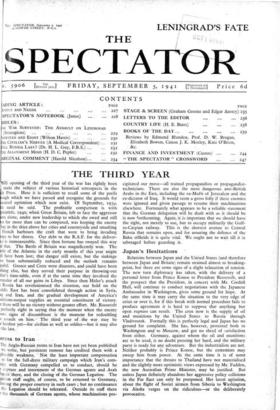Japan's Hesitations '
Relations between Japan and the United States (and therefore between Japan and Britain) remain strained almost to breaking- point, but there are some signs of a slight relaxation of tension. The new turn diplomacy has taken, with the delivery of a personal letter from Prince Konoe to President Roosevelt, and the prospect that the President, in concert with Mr. Cordell Hull, will continue to conduct negotiations with the Japanese Ambassador in Washington, gives some ground fOr hope. At the same time it may carry the situation to the very edge of crisis or over it, for if this break with normal procedure fails to produce agreement it is hard to suppose that anything but open rupture can result. The crux now is the supply of oil and munitions by the United States to Russia through Vladivostok. Formally this is perfectly legal and Japan has no ground for complaint. She has, however, protested both to Washington and to Moscow, and got no shred of satisfaction from either. Germany, against whom the oil and munitions are to be used, is no doubt pressing her hard, and the military party is ready for any adventure. But the industrialists are not. Neither probably is Prince Konoe, but the extremists may sweep him from power. At the same time it is of some importance that the threats to Thailand have not materialised and the slightly more optimistic views expressed by Mr. Fadden, the new Australian Prime Minister, may be justified. But unless Japan definitely abandons her aggressive policy collisions in the Far East can only be postponed. Her latest agitation, about the flight of Soviet airmen from Siberia to Washington via Alaska verges on the ridiculous—or the deliberately provocative.


























